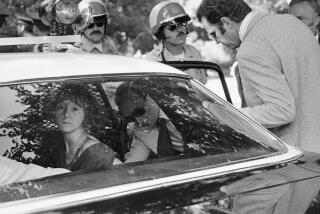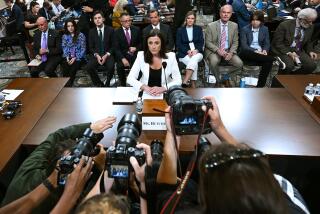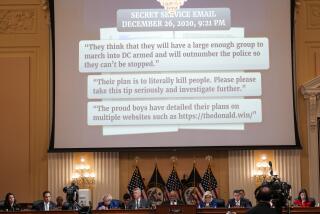Foster’s Concerns Over Mrs. Clinton Told
- Share via
WASHINGTON — A short time before his suicide, Deputy White House Counsel Vincent Foster voiced concern that another presidential aide might accuse First Lady Hillary Rodham Clinton of improprieties in the White House travel office fiasco, the Senate Whitewater Committee was told Tuesday.
New York attorney Susan Thomases, a longtime confidante of Mrs. Clinton, said that Foster told her about his worries days before he took his life in July 1993. Foster said that he feared the first lady might be made “an unfair target” by David Watkins, then-White House director of administration, Thomases said.
Watkins was among White House staff members who later were reprimanded by President Clinton for their role in firing seven travel office employees in May 1993. The president subsequently apologized for the firings and offered the employees other government jobs.
Republicans on the committee, chaired by Sen. Alfonse M. D’Amato (R-N.Y.), sought to show that Foster’s concerns about Mrs. Clinton’s role in the travel office controversy led then-White House Counsel Bernard Nussbaum to prevent outside authorities from searching Foster’s office in the days after his body was found in a suburban Virginia park on July 20, 1993. Thomases, however, said that she knew nothing about such a reason for Nussbaum’s action.
Nussbaum, who left the White House two years ago, has testified that he simply did not want investigators who were looking for a suicide note to peruse national security documents or papers related to future Supreme Court nominees or other confidential matters in Foster’s files.
Ironically, Watkins--the object of Foster’s concern--exonerated the first lady of any major role in the firings when he was first questioned in December 1993 by congressional investigators. But Watkins’ own memos, obtained earlier this year by a House committee, seemed to contradict his sworn statements by relating that Mrs. Clinton had pushed for the travel office shake-up.
As a result, Whitewater independent counsel Kenneth W. Starr has opened an investigation into the travel office controversy to determine if Watkins committed perjury. Watkins, a former Little Rock, Ark., advertising director, was fired from the White House staff in 1994 for taking a government helicopter to play golf in suburban Maryland.
*
Thomases, who has appeared previously before the committee, was asked if she had apprised the first lady of Foster’s concerns about Watkins.
“Not that I remember,” she replied.
Thomases testified that she saw the president a few days after Foster’s death and told him that she felt guilty because “I should have had an inkling but I did not” that Foster was mentally upset.
A torn-up suicide note later found in Foster’s briefcase indicated his general concern about congressional charges in the travel office case but not specifically about the first lady or Watkins.
Senators questioned Thomases about an undated handwritten memo by Lorraine Voles, a White House communications aide, that quoted Thomases as saying: “Hillary wants these people fired.”
Referring to former White House Chief of Staff Thomas “Mack” McLarty, the memo went on to say that Thomases “went to Mac” about the first lady’s wishes but that “Mac wouldn’t do it.” It added that “DW [Watkins] didn’t want to do it.”
*
Asked if she had done this, Thomases told senators: “Not that I recall.”
The House Government Reform and Oversight Committee has developed evidence during a three-year inquiry that Mrs. Clinton pressed Watkins, Foster and other senior White House aides for the travel office shake-up at the urging of Hollywood producer Harry Thomason, a close friend of the Clintons. Thomason had part-interest in a travel-related company that was seeking more government work, House testimony has shown.
Meanwhile, defense attorneys presented closing arguments to a jury in Little Rock, as a Whitewater-related fraud and conspiracy trial involving three former associates of the president neared its conclusion.
Sam Heuer, representing defendant James B. McDougal, the president’s former business partner in the Whitewater land venture, said that chief prosecution witness David Hale had spun “a web of lies,” which were successfully rebutted in videotaped testimony by the president.
More to Read
Sign up for Essential California
The most important California stories and recommendations in your inbox every morning.
You may occasionally receive promotional content from the Los Angeles Times.










